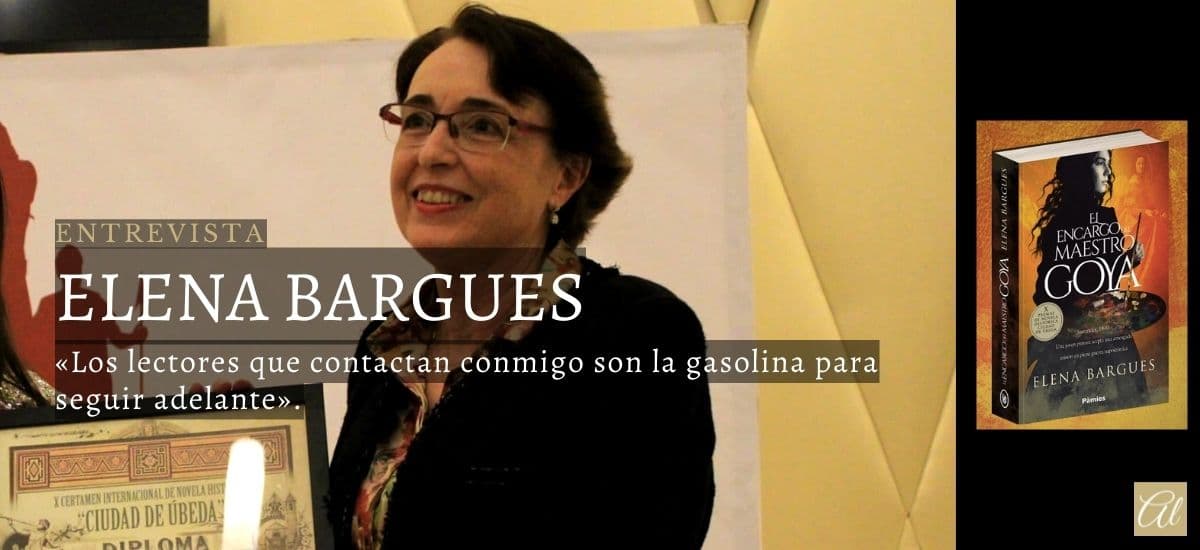
Photography: Elena Bargues, Facebook profile.
Elena Bargues, Valencian by birth and based in Cantabria, won last X International Contest of Historical Novel «Ciudad de Úbeda» with Master Goya's commission. Thank you very much for your time and kindness for this interview where he tells us about her and much more.
Elena Bargues—Interview
- ACTUALIDAD LITERATURA: Your new novel is titled Master Goya's commission. What do you tell us about it and where did the idea come from?
ELENA BARGUES: It stands at Santander in 1810 during the napoleonic war. The central plot is around a Zurbaran's painting —Santa Casilda— that master Goya, a court official, orders a disciple, Marta, to falsify it and give the change to the French so that the original does not leave Spain. In this adventure she finds herself sheltered by her brothers, Mercedes and Salvador Velarde.
The idea arose from the painting's own history. He disappeared in 1808 from the Hospital de la Sangre in Seville —along with his companions, although there was no news about them—, and no more was heard of until 1814, the year in which the officials entered the Madrid palace to inventory what was missing. the French had taken it away and it appeared in the Chimney Room. But the frame had lost four inches in width in the adventure. The seed was sown.
- TO THE: You can go back to that first book you read? And the first story you wrote?
E.B.: I was very young, but I remember perfectly: Celia what she says, by Elena Fortun.
As for the first thing I wrote was The assault on Cartagena de Indias. I did not write anything before, neither stories nor stories; in fact, I don't know how to write them, they have another technique. I didn't feel the need either. write, this has been a late calling. However, I have been and am a great reader: I have many hours and many novels behind my back.
- AL: A head writer? You can choose more than one and from all eras.
E.B.: Do not have. It would be impossible for me to name one. There are many who have left a mark on the soul. But I can mention two classics: Quevedo and Oscar Savage, both satirical, rebellious and of great ingenuity, but, if you know how to read beyond words, of great sensitivity and observation skills. I always discover something new.
- AL: What character in a book would you have liked to meet and create?
E.B.: Well, look, I think that Alonso quijano, Mr Darcy, the count of Montecristo and Don Juan Tenorio they are unforgettable. They have made history without being historical, a good paradox.
- AL: Any special habits or habits when it comes to writing or reading?
E.B.: When I read, the verification of the places or facts to which the novel refers; including author biography. I think it is essential to know the author to understand his work and vice versa, as well as how much truth there is. For that reason I keep a web page open with a lot of additional information about my novels, for those who want to know more.
At the hour of writing, none noteworthy. I imagine that will happen to all writers when they are in the middle of creation: the characters jumping through the mind and pushing to get out, the ideas, the conversations they have while you're cooking or in the shower or shopping. It is something unavoidable.
- AL: And your preferred place and time to do it?
E.B.: read anytime, if I can. You can't miss the time at night: it's a rite without which I can't sleep.
For writeI am lucky to have one room for myself. As for the schedule, during the day, and as long as I have more than an hour, otherwise, it is not worth putting myself to the task.
- AL: Are there other genres that you like?
EB: Everyone. But some more than others. I would highlight the Historical, romantic, police and of mystery.
- What are you reading now? And writing?
E.B.: I don't know if you want to know because I'm in the middle of documentation to start my new novel: Canovas, by Benito Pérez Galdos. But well, the last novel, or rather essay, In the footsteps of Jane Austen, that he dedicated to me Espido freire in Úbeda, when he gave me the award for best historical novel, and I hadn't had time to read it. It's just that I brought a lot of books. If you dare to go to Úbeda on the days that the contest is held, bring good money, because the temptation is enormous. And then comes the regret of not having bought any more.
- AL: How do you think the publishing scene is and what decided you to try to publish?
E.B.: A publisher is a company, and as a company it is like the rest of Spanish companies: trembling. If to this we add the loss of readers due to low educational quality, because it is not a company with a promising future. They bet on the safe and not on the new promises. It is a very big investment to get a stranger ahead, although we all dream of winning that lottery.
It decided what everyone did: «And if…»; or "I don't already have him."
- AL: Is the moment of crisis that we are experiencing being difficult for you or will you be able to keep something positive for future stories?
E.B.: Winning the X International Historical Novel Contest “Ciudad de Úbeda” helps me a lot, and I hope continued good luck in advancing my literary career. I trust what I write and I am not easily discouraged. Readers who contact me are the fuel to keep going. On the other hand, I like and enjoy writing. If she couldn't post, she would still. It's already part of me.